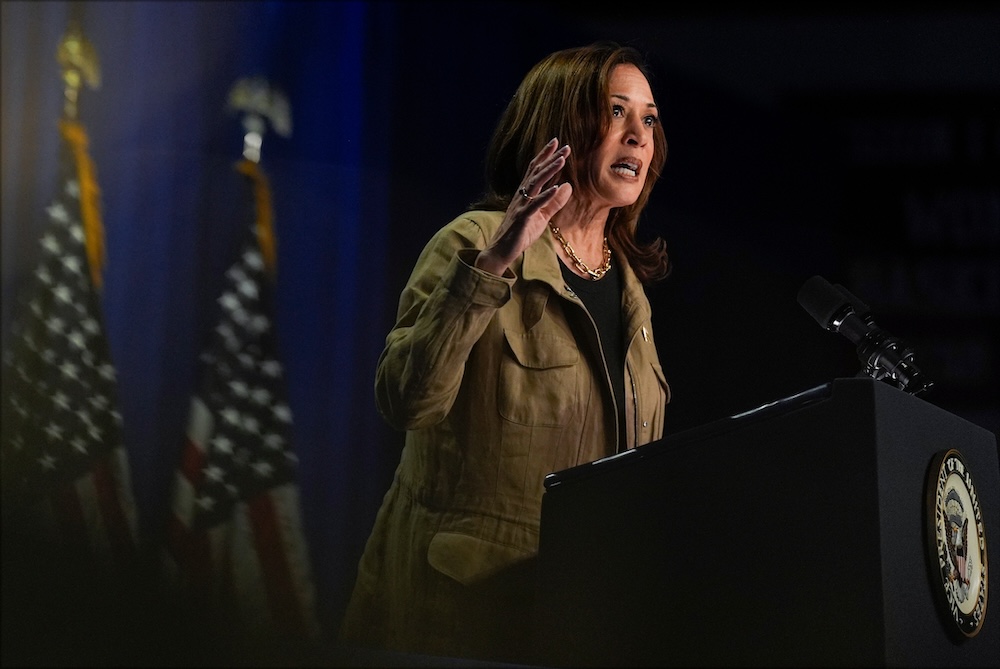Politics
BREAKING: Kamala Harris’ Rampant Plagiarism Revealed In Bombshell Report

In a bombshell report released on Monday, Vice President Kamala Harris has been accused of plagiarizing significant portions of her book, Smart on Crime: A Career Prosecutor’s Plan to Make Us Safer. The news, reported by conservative activist Christopher F. Rufo, ignited controversy as Harris returned to the campaign trail on Monday.
Known for investigative work, Rufo laid out multiple instances of alleged plagiarism within Harris’s book, which she co-authored with ghostwriter Joan O’C Hamilton. The book, originally published in 2009, played a crucial role in solidifying Harris’s reputation on criminal justice reform as she campaigned for California Attorney General. However, new analysis has revealed that key sections of the book appear to be copied from various sources, including media outlets, government reports, and even Wikipedia.
EXCLUSIVE: Kamala Harris plagiarized at least a dozen sections of her criminal-justice book, Smart on Crime, according to a new investigation. The current vice president even lifted material from Wikipedia.
We have the receipts. 🧵
— Christopher F. Rufo ⚔️ (@realchrisrufo) October 14, 2024
In one of the first allegations detailed by Rufo, Harris allegedly lifted entire passages discussing high school graduation rates from an uncited report by NBC News. The text in question is nearly identical to a section found in an AP/NBC News report, including specific statistics regarding graduation rates in major U.S. cities. Such material was included in her book without proper attribution, according to Rufo’s findings.
We can begin with a passage in which Harris discusses high school graduation rates. Here, she lifted verbatim language from an uncited AP/NBC News report: pic.twitter.com/pZv5mD3m5t
— Christopher F. Rufo ⚔️ (@realchrisrufo) October 14, 2024
One of the most significant instances of plagiarism identified involves text from a press release by John Jay College of Criminal Justice. In the book, Harris describes a drug prevention strategy implemented in High Point, North Carolina, which had been outlined in the press release. Rufo notes that Harris and her co-author failed to provide any attribution, instead passing off the detailed language as their own. This included entire paragraphs that describe the results of the strategy, the locations where it had been replicated, and its alleged success in reducing crime rates.
Rufo highlighted this case in his report, stating, “Kamala Harris has become famous, in part, for her unique rhetorical style. She switches freely between various accents and peppers her speeches with catchphrases: pondering falling ‘out of a coconut tree,’ discussing ‘the significance of the passage of time,’ and moving the nation toward ‘what can be, unburdened by what has been.’”
In a section about a New York court program, Harris stole long passages directly from Wikipedia—long considered an unreliable source. She not only assumes the online encyclopedia's accuracy, but copies its language nearly verbatim, without citing the source. Here is Harris's… pic.twitter.com/qrwHE8AAgk
— Christopher F. Rufo ⚔️ (@realchrisrufo) October 14, 2024
Perhaps the most surprising element of the allegations is the revelation that Harris relied on Wikipedia, an often unreliable source, for parts of her book. In discussing a New York court program, Harris allegedly copied entire passages from a Wikipedia entry. Not only did Harris fail to properly cite the source, but she also failed to verify the accuracy of the information she presented. Rufo wrote that Harris incorrectly cited a figure related to illegal vending in the city, drawing from an erroneous interpretation of the Wikipedia entry she copied.
In another section of the book, Harris allegedly used language from a Bureau of Justice Assistance report, which was linked in the same Wikipedia entry. The report provided detailed descriptions of crime reduction initiatives in various cities, including West Palm Beach, Florida, which Harris apparently reproduced verbatim in her book without credit.
Finally, when attempting to write a description of a nonprofit group, Harris simply lifted promotional language from an Urban Institute report, and failed to cite her source: pic.twitter.com/WpcC0SkpT5
— Christopher F. Rufo ⚔️ (@realchrisrufo) October 14, 2024
In his report, Rufo lays out other instances where Harris allegedly lifted language from government documents, nonprofit reports, and media outlets without giving credit. For example, when describing a nonprofit organization, Harris allegedly copied promotional language from an Urban Institute report, once again failing to cite her source.
Plagiarism, often considered an “academic crime,” undermines the integrity of any work and could tarnish Harris’s reputation as she seeks higher office. While public figures often rely on ghostwriters to help draft books, it is ultimately their responsibility to ensure that proper attribution is given where needed. Rufo concluded his report by calling for Harris and her publisher to issue a public correction and retract the plagiarized sections of the book.

